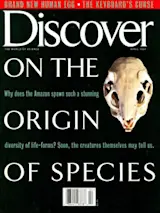Huntington’s disease causes parts of the brain to degenerate and thus inflicts a host of symptoms on its victims. Chief among these are wild, dancelike limb movements known as chorea. But there are cognitive effects as well: people with Huntington’s have trouble interpreting the emotions of others, mistaking fear for anger, sadness for surprise, or any of these for nothing at all. Neuropsychologist Reiner Sprengelmeyer of Ruhr University in Bochum, Germany, recently investigated this aspect of the disease by asking patients to identify the changing emotions expressed by a face on a computer screen. He found that Huntington’s patients have problems recognizing all emotions except happiness, but experience the greatest difficulty of all in identifying disgust. Ten out of 13 Huntington’s patients were almost completely unable to recognize it. Sprengelmeyer believes that disgust is an emotion that arose early in our evolutionary history, perhaps as a nonverbal warning of spoiled food. And as it arose, a specific part of the brain became dedicated to its recognition. This structure, he thinks, may reside in the caudate nucleus, a part of the brain involved in cognition and movement that is always destroyed by Huntington’s. There is a long-standing hypothesis that all emotions are processed by the same brain structure, says Sprengelmeyer. Our finding suggests that there are several structures that are important for decoding different emotions.
Fear and Loathing in Bochum
Explore Huntington’s disease symptoms, including chorea and cognitive effects that hinder emotion recognition. Learn more about its impacts.
More on Discover
Stay Curious
SubscribeTo The Magazine
Save up to 40% off the cover price when you subscribe to Discover magazine.
Subscribe













